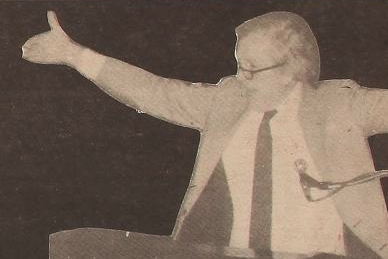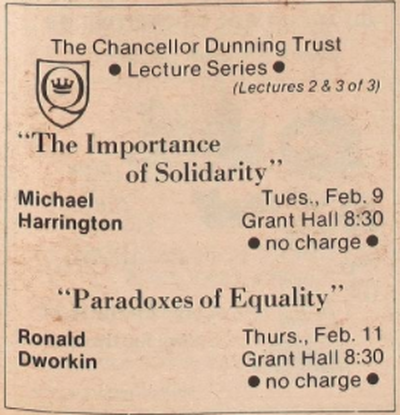
Michael Harrington was a prolific socialist writer and at the time of his talk was a political scientist at Queen’s College (NYC). He was also a founding member of Democratic Socialists of America. Harrington served as the first editor of New America, the official weekly newspaper of the Socialist Party-Social Democratic Federation, founded in October 1960. In 1962, he published The Other America: Poverty in the United States, a book that has been credited with sparking John F. Kennedy and Lyndon Johnson’s War on Poverty and won a George Polk Award and The Sidney Award. In it, he revealed that 40-50 million Americans were living in poverty even in a time of supposed affluence. He went on to become a widely-read intellectual and political writer. In 1972, he published a second bestseller, Socialism. He wrote numerous other works over his career, including 14 additional books and articles in journals such as The Nation and The New Republic. He died in 1989.
In his lecture, Harrington described solidarity as the sense of global family and argued for the expansion of the boundaries of human compassion. Rather than address immediate injustices, he chose to focus on the basic values required to make meaningful response to these injustices possible. Solidarity, as he defined it, was a feeling of oneness with people you don’t know, a willingness to act on their behalf and to sacrifice for them, with no expectation of a return on your emotion. He argued that if humankind was to survive in the long-term, it needed to create a planetary solidarity. Harrington illustrated the growth of solidarity, suggesting that it emerged from familial relationships, with a frontier of compassion that grew over the millennia. By the late 20th century, compassion was extending radically beyond the nation. Harrington drew on the ongoing UN debates about the concept of the Common Heritage of Humankind as it was being applied to the sea and to outer space, suggesting that they were early manifestations of planetary solidarity. While he was unsure if this would be reached in his lifetime, or ever, he believed that human society ultimately needed it to survive.
Listen to his lecture below.
